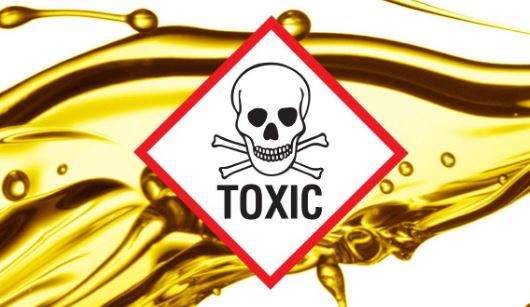Synthetic motor oil has been gaining popularity among car owners due to its superior performance and longer lifespan compared to conventional motor oil. However, there has been some concern about whether Is Synthetic Motor Oil Toxic and harmful to the environment.
Synthetic motor oil is made from a combination of base oils and chemical additives, which can raise questions about its safety. Some people believe that synthetic motor oil is more toxic than conventional motor oil, while others argue that it is safer because it contains fewer impurities. In this, we will explore the topic of synthetic motor oil toxicity, examining the chemical composition of synthetic motor oil and its potential impact on human health and the environment.
What is Synthetic Motor Oil?

Synthetic motor oil is a type of lubricant that is made from chemical compounds. It is designed to provide better engine performance and protection than conventional mineral-based oils. Synthetic motor oil is made by combining base oils with a variety of additives to enhance its properties. The resulting oil is more stable and consistent than conventional oils, which can break down and lose their effectiveness over time.
One of the key advantages of synthetic motor oil is that it can withstand high temperatures and extreme conditions better than conventional oils. This is because synthetic oils are engineered to have a more uniform molecular structure, which allows them to flow more easily and resist breaking down under stress. Synthetic oils also have a higher viscosity index, which means they maintain their thickness and lubricating properties over a wider range of temperatures.
There are different types of synthetic motor oils available, including full synthetic, synthetic blend, and high mileage synthetic oils. High mileage synthetic oils are designed for older engines with high mileage, and contain additional additives to help reduce wear and tear.
Overall, synthetic motor oil is a high-performance lubricant that offers superior protection and performance compared to conventional oils. While it may be more expensive than conventional oils, the benefits it provides are well worth the investment for those who want to ensure their engine stays running smoothly for years to come.
Toxicity of Synthetic Motor Oil

Potential Health Effects
Synthetic motor oil is not inherently toxic to humans. However, it can cause harm if ingested or inhaled in large quantities. The main components of synthetic motor oil include base oils, viscosity modifiers, and additives. These components can be harmful if ingested or inhaled in large quantities.
Ingestion of synthetic motor oil can cause gastrointestinal irritation, nausea, and vomiting. If a large amount is ingested, it can lead to more serious health problems such as respiratory failure, seizures, and even death. Inhalation of synthetic motor oil can cause respiratory irritation, coughing, and difficulty breathing.
Environmental Impact
Synthetic motor oil can have a negative impact on the environment if it is not disposed of properly. Used synthetic motor oil contains contaminants such as heavy metals, polyaromatic hydrocarbons (PAHs), and other toxic chemicals. If disposed of improperly, these contaminants can leach into the soil and water, causing harm to plants and animals.
To minimize the environmental impact of synthetic motor oil, it should be recycled or disposed of at a designated collection facility. Many auto parts stores and service centers offer used oil collection services.
In conclusion, synthetic motor oil is not toxic to humans in small quantities. However, it can cause harm if ingested or inhaled in large quantities. Used synthetic motor oil should be disposed of properly to minimize its environmental impact.
Comparing Synthetic and Conventional Motor Oil
Toxicity of Conventional Motor Oil
Conventional motor oil is derived from crude oil and contains various impurities, such as sulfur and nitrogen compounds, that can be harmful to the environment. When conventional motor oil is used in a vehicle, it can release toxic emissions into the air and water, leading to pollution. Additionally, conventional motor oil can be harmful if ingested or inhaled, and it can cause skin irritation.
Benefits of Synthetic Motor Oil
Synthetic motor oil, on the other hand, is engineered to be more environmentally friendly and less toxic. It is made from a chemical process that removes impurities and creates a more consistent and pure product. Synthetic motor oil also has a longer lifespan than conventional motor oil, which means fewer oil changes are needed, reducing waste and pollution.
One of the main benefits of synthetic motor oil is that it reduces engine wear and tear. It has a more consistent viscosity, which means it flows more easily and lubricates engine parts better than conventional motor oil. This can lead to improved fuel economy and longer engine life.
Synthetic motor oil is also more resistant to high temperatures and extreme weather conditions. It can withstand extreme cold and heat, which makes it ideal for use in areas with harsh climates. Additionally, synthetic motor oil has better resistance to oxidation and sludge formation, which means it can keep engines cleaner and running more efficiently.
Overall, synthetic motor oil is a safer and more environmentally friendly alternative to conventional motor oil. While it may be more expensive, the benefits of synthetic motor oil outweigh the costs in terms of engine performance, longevity, and environmental impact.
FAQ About Is Synthetic Motor Oil Toxic
Is synthetic motor oil toxic to humans and animals?
Synthetic motor oil is generally considered safe for humans and animals when used properly. However, like any chemical substance, it can be harmful if ingested or inhaled in large quantities. It is important to follow proper safety procedures when handling and disposing of synthetic motor oil.
Is synthetic motor oil harmful to the environment?
Synthetic motor oil is designed to be more environmentally friendly than traditional motor oil. It is made from synthetic compounds that are less harmful to the environment than the crude oil used to make traditional motor oil. However, synthetic motor oil can still be harmful if not disposed of properly. It is important to recycle used synthetic motor oil to prevent it from contaminating the environment
Can synthetic motor oil cause health problems?
Synthetic motor oil is generally considered safe for humans when used properly. However, some people may be sensitive to the chemicals used in synthetic motor oil and may experience skin irritation or other health problems. It is important to follow proper safety procedures when handling synthetic motor oil to minimize the risk of health problems.
How should I dispose of used synthetic motor oil?
Used synthetic motor oil should be recycled. Many auto parts stores and other businesses accept used motor oil for recycling. It is important to never dump used motor oil down the drain or in the trash, as it can contaminate the environment and harm wildlife.
Is synthetic motor oil better than traditional motor oil?
Synthetic motor oil offers several advantages over traditional motor oil. It provides better performance and protection for your engine, lasts longer between oil changes, and is more environmentally friendly. However, synthetic motor oil is more expensive than traditional motor oil, so it may not be the best choice for everyone.
Final Thought
In the end, synthetic motor oil is not inherently toxic. It is specifically designed to provide better performance and protection for modern engines compared to conventional oils. Synthetic motor oils are manufactured using a precise blend of base oils and additives, which undergo extensive testing and quality control measures to ensure their safety and effectiveness.
The composition of synthetic motor oil can vary depending on the brand and specific product, but in general, it contains fewer impurities and contaminants than conventional oils. Synthetic oils are engineered to have a consistent molecular structure, which helps them resist breakdown under extreme temperatures and prolonged use. This stability allows synthetic oils to provide superior lubrication and reduce engine wear, resulting in improved fuel efficiency and extended engine life.
Related Topics:
- How Long to Let Engine Cool Before Adding Oil
- Oil Change Check Engine Light
- Which Engine Component Stores Oil for Lubrication
- How To Remove Oil Pan Without Removing Engine
- Is It Ok to Change Engine Oil Brands
- Will an Engine Overheat Without Oil
- Can You Use 15w40 Diesel Oil in a Gas Engine
- is engine oil same as transmission fluid
- Is Engine Oil Flammable
- what happens if you put transmission fluid in the oil
- what will happen if i don’t use dexos oil


